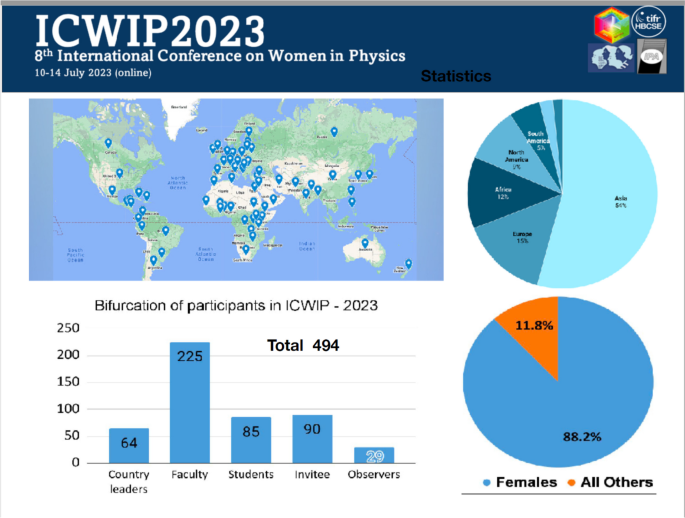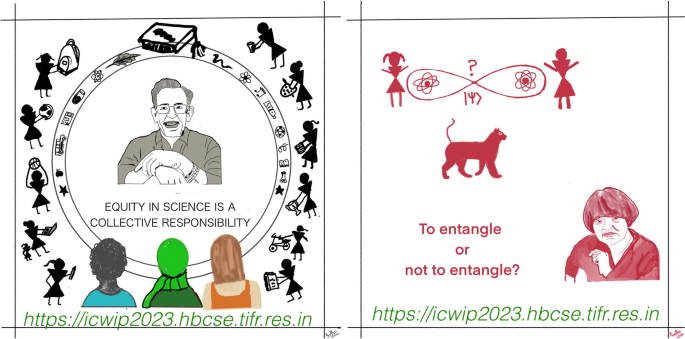2 ICWIP2023 AAPPS Report by Srubabati Goswami and Vandana Nanal
The 8th IUPAP International Conference on Women in Physics (ICWIP2023), organized by the Gender in Physics Working Group (GIPWG) of the Indian Physics Association (IPA) and Tata Institute of Fundamental Research (TIFR), was held online from July 10 to 14, 2023. ICWIP2023, hosted by the Homi Bhabha Centre for Science Education (HBCSE) of TIFR, was inaugurated by Prof. A. K. Sood, the principal scientific adviser to the Government of India, where Prof. Jayaram Chengalur (director, TIFR), Prof. Arnab Bhattacharya (center director, HBCSE), Dr. S. M. Yusuf (IPA president), and Prof. Silvina Pons-Dawson (IUPAP president-designate) were present. In the inaugural speech, Prof. Sood emphasized the role of women in the advancement of science and society and suggested that mentorship programs for young women, flexible work policies for middle age groups, and leadership roles as well as significant research grants for senior women researchers will be a way forward. Prof. Rohini Godbole presented an overview of WiP in India, while Prof. Lilia Meza Montes, (Chair, WG5: women in physics working group of IUPAP) talked about the history of ICWIP.
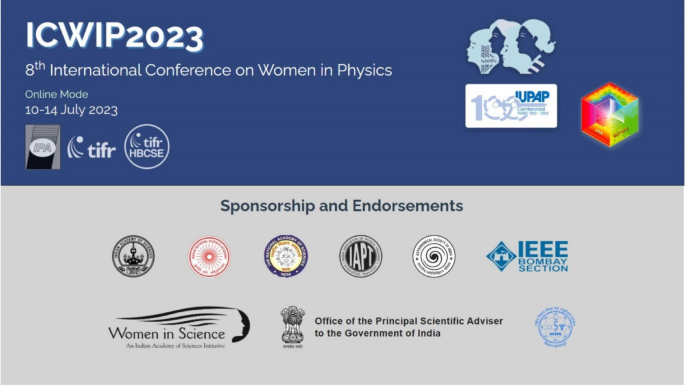
Prof. Vandana Nanal (TIFR) and Prof. Shrubabati Goswami (PRL), co-chairs of the ICWIP2023 local organizing committee, together with Prof. Lilia Meza Montes (Chair, IUPAP-WG5), led the conference proceedings, where nearly 500 delegates from 70 countries, including about 200 participants from India, took part. A schematic presentation of the conference statistics is given in Fig. 1. It is noteworthy that ten AAPPS member countries were represented in the conference.
The conference program included plenary and keynote talks, interactive workshops, panel discussions, and a session on resolutions. An important feature of the conference was the presentation of country posters, depicting progress and new activities related to gender in physics. Participants also presented posters (~120) on various topics, including contemporary physics research, and gender in physics and physics education. The poster sessions on the frame platform were particularly appreciated by the participants. For the first time, the best poster awards (sponsored by IOP Publishing, UK) were given at the conference.
The keynote talk was given by Prof. Karen Halberg (recipient of the 2019 L’Oreal-UNESCO International Award For Women in Science, Latin America) on “Quantum Condensed Matter: A Playground for Emergent Phenomena and Complexity and why I am passionate about this field,” and the session was chaired by Prof. Prajval Shastri (Vice-chair, IUPAP-WG5).
The plenary talks presented an overview of some of the latest developments in quantum computation, astronomy, collider physics, laser and plasma physics, and climate education. Dorothy Gordon (board member, UNESCO) talked about the danger of the stochastic parrot problem (i.e., generating language without understanding) in the context of artificial intelligence. Discussions also touched on geographical and gender biases in publications and measures to overcome these issues. Studies related to institutional racism and sexism were presented. A panel discussion on COVID-19 and its aftermath, especially on women, was held. Participants had the opportunity to interact with eminent women scientists and social scientists in workshop sessions on physics education, data analysis, intersectionality, leadership, and development (Fig. 2).
A documentary on the Giant Meterwave Radio Telescope (GMRT) of TIFR, IUPAP’s centenary celebration and the Nobel lectures of two women physicists, Donna Strickland and Andrea Ghez, were shown to the participants. Deliberations in social and networking sessions highlighted the need to create a repository of various resources and avenues. It was also suggested to create handbooks of best practices. A presentation was made on HBCSE’s Vigyan Pratibha, a science education project aimed at promoting talent among students, which generated extensive interest.
Regional Women in Physics (WiP) meetings were also held during the conference. The AAPPS-WiP meeting had a detailed discussion on its present activities. Suggestions for widening its reach and a resolution regarding a future course of action were made.
To celebrate women physicists, a novel feature was introduced in this online conference. The sessions were held in various halls, named after women scientists. For details, visit the Hall of Fame of ICWIP2023.
The conference also showcased a rich heritage of Indian dance art. Participants had the opportunity to observe a Bharatnatyam (classical dance) recital by Dr. Sharada Srinivasan and to watch the Sattriya dance by Dr. Pratibha Sharma and Bihu dance (folk dance of the north-eastern state of India, Assam) by Mousumi Bora and group.
Recommendations emerging from the discussions included the creation of hybrid meetings for wider access and enhanced networking, focused programs for mentoring, targeted support for developing countries, showcasing the scientific achievements of women, the establishment of resource sites for dissemination of information, and creating and maintaining a gender balance in decision making bodies. It is further suggested that gender awareness workshops be made mandatory by academic institutes.
2.1 Satellite events in India
Utilizing the ICWIP platform, several events have been planned in India throughout 2023 in order to generate widespread awareness. Included are the Pavinari lecture series (showcasing works of women scientists), a panel discussion on “Are MCQ (multiple choice question) tests gendered?” held in ShivNader Institute of Eminence (Delhi NCR) and an interactive session at Gitam University, Hyderabad, on “Teaching Physics Effectively Online.”
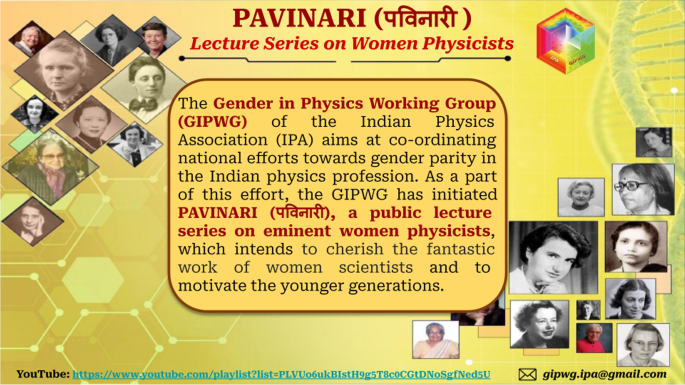
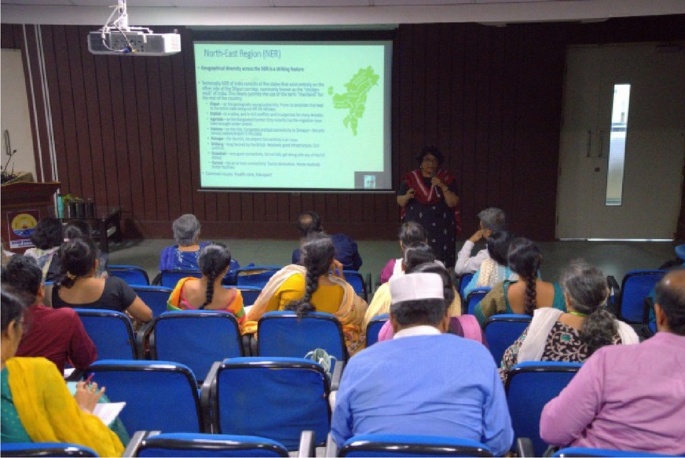
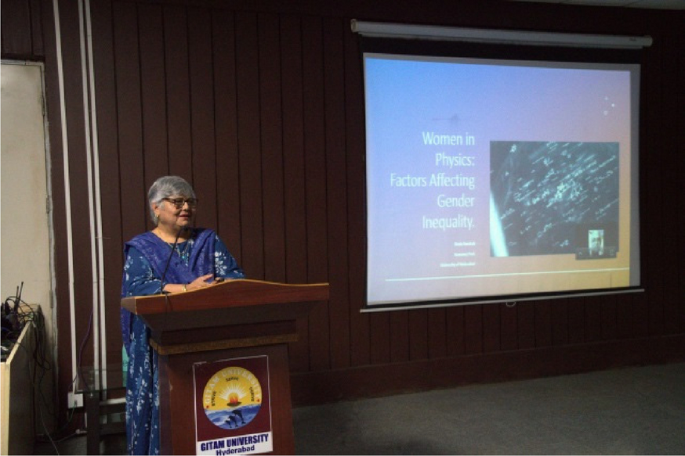
Additionally, the workshops organized by Indian team members on combating biases and equity in digital space were timely as they highlighted the challenges experienced by physics communities in India and abroad. Discussions further emphasized the global nature of the problems related to online teaching and underscored the need for mitigating these issues in order to achieve equitable growth.
In summary, as pointed out by Prof. Nathiel Brown, diversity contributes to excellence in science and equity is a collective responsibility.
We are grateful to Prof. Lilia Meza Montes for her guidance and valuable help in making the conference successful. We also sincerely thank IUPAP-WG5, the local advisory committee and the local organizing committee of ICWIP2023, for their support. In addition to the registration fee, financial support was received from TIFR, IPA, and NISER (the National Institute for Science, Education and Research).
Please visit the conference website for further details. The plenary sessions are available on the YouTube channel https://tinyurl.com/ICWIPPLENARY.


